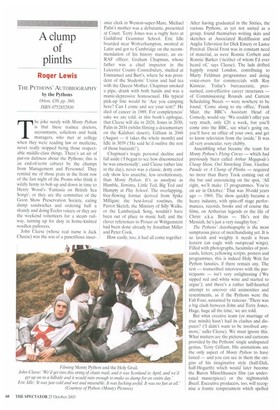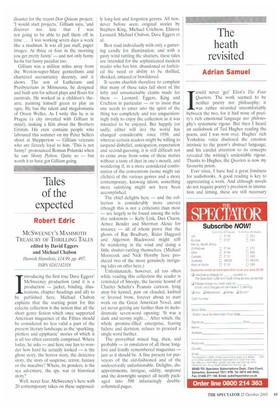A clump of plinths
Roger Lewis
THE PYTHONS' AUTOBIOGRAPHY by the Pythons Orion, £30, pp. 360, ISBN 0752852930 The joke surely with Monty Python is that these trainee doctors, accountants, solicitors and bank managers, who met at college when they were reading law or medicine, never really stopped being those respectable middle-class things. There's an air of put-on daftness about the Pythons; this is an end-of-term cabaret by the chumps from Management and Personnel. They remind me of those prats in the front row of the last night of the Proms who think it wildly funny to bob up and down in time to Henry Wood's 'Fantasia on British Sea Songs'; or they are the committee of the Goon Show Preservation Society, eating damp sandwiches and ordering half a shandy and doing Eccles voices; or they are the weekend volunteers for a steam railway, turning up for duty in home-knitted woollen pullovers.
John Cleese (whose real name is Jack Cheese) was the son of a punctilious insur
ance clerk in Weston-super-Mare. Michael Palin's mother was a debutante, presented at Court. Terry Jones was a rugby hero at Guildford Grammar School. Eric Idle hoarded near Wolverhampton, swotted at Latin and got to Cambridge on the recommendation of his history master, an exRAF officer. Graham Chapman, whose father was a chief inspector in the Leicester County Constabulary, studied at Emmanuel and Bart's, where he was president of the Students' Union and had tea with the Queen Mother. Chapman smoked a pipe, drank with both hands and was a manic-depressive homosexual. His typical pick-up line would be 'Are you camping here? Can I come and see your tent?' He died of cancer in 1989. For completeness' sake we are told, in this book's epilogue, that Cleese will die in 2028, Jones in 2030, Palin in 2034 (whilst filming a documentary on the Kalahari desert), Gilliam in 2046 (August — it takes the whole month) and Idle in 3039 ('He said he'd outlive the rest of those bastards').
Chapman's tragic personal decline and fall aside CI began to see how disconnected he was emotionally', said Cleese rather late in the day), never was a classic, dotty comedy show less anarchic, less revolutionary, than Monty Python. It's as anodyne as Hamble, Jemima, Little Ted, Big Ted and Humpty at Play School. The overlapping, free-flowing format derived from Spike Milligan; the best-loved routines, the Parrot Sketch, the Ministry of Silly Walks, or the Lumberjack Song, wouldn't have been out of place in music hall; and the clever references to Proust or Wittgenstein had been done already by Jonathan Miller and Peter Cook.
How easily, too, it had all come together. After having graduated in the Sixties, the various Pythons, as yet not united as a group, found themselves writing skits and sketches at Associated Rediffusion and Anglia Television for Dick Emery or Lance Percival. David Frost was in constant need of material, as were Ronnie Corbett and Ronnie Barker ('neither of whom I'd ever heard of,' says Cleese). The lads drifted happily round London, contribuing to Marty Feldman programmes and doing voice-overs for commercials with Roy Kinnear. Today's bureaucratic, pressurised, cost-effective career structures — of Commissioning Rounds and Current Scheduling Needs — were nowhere to be found. 'Come along to my office,' Frank Muir, the BBC's Assistant Head of Comedy, would say. 'We couldn't offer you very much, only £20 a week, but you'll come into the BBC, see what's going on, you'll have an office of your own, and get to know television from the inside.' It was all very avuncular, very clubby.
Assembling what became the team for Monty Python's Flying Circus — which had previously been called Arthur Megapode's Cheap Show, Owl Stretching Time, Vaseline Parade or A Clump of Plinths — required no more than Barry Took coming out of the bar and announcing on the spot. 'All right, we'll make 13 programmes. You're on air in October.' That was 30-odd years ago — 1969. The show quickly became a heavy industry, with spin-off stage performances, records, books and of course the films, on Arthurian legends or the life of Christ a.k.a. Brian — 'He's not the Messiah, he's just a very naughty boy.'
The Pythons' Autobiography is the most sumptuous piece of merchandising yet. It is so lavish and weighty it needs a brass lectern (an eagle with outspread wings). Filled with photographs, facsimiles of postcards, letters, yellowing scripts, posters and programmes, this is indeed Holy Writ for Python fanatics, if there remain any. The text — transcribed interviews with the participants — isn't very enlightening ('We sipped red and white wine and started to argue'); and there's a rather half-hearted attempt to uncover old animosities and resentments, as if the Pythons were the Fab Four, sustained by rancour. 'There was a big clash between John and Terry Jones. Huge, huge all the time,' we are told.
But what creative team (or marriage of true minds) hasn't had its clashes and disputes? CI didn't want to be involved anymore,' sulks Cleese). We must ignore this. What matters are the pictures and cartoons provided by the Pythons' single undisputed genius, Terry Gilliam. His animations are the only aspect of Monty Python to have lasted — and you can see in them the origins of his imaginative style (half-Dali, half-Hogarth) which would later become the Baron Miinchhausen film (an underrated masterpiece) or the nightmarish Brazil. Executive producers, too, will recognise a frantic temperament which spelled
disaster for the recent Don Quixote project. 'I would start projects,' Gilliam says, 'and discover too late that I was not going to be able to pull them off in time . . . I was working seven days a week like a madman. It was all just stuff, paper images. At three or four in the morning you get pretty funny' — and not only funny ha-ha but funny peculiar too.
Gilliam was a million miles away from the Weston-super-Mare genteelisms and chartered accountancy decency, and it shows. The son of Lutherans and Presbyterians in Minnesota, he designed and built sets for school plays and floats for carnivals. He worked in a children's theatre, painting himself green to play an ogre. He has the talent and megalomania of Orson Welles. As I write this he is in Prague (a city invented with Gilliam in mind), making a film about the Brothers Grimm. His crew contains people who laboured this summer on my Peter Sellers shoot at Shepperton — Gilliam veterans who are fiercely loyal to him. 'This is not funny!' pronounced Roman Polanski when he saw Monty Python. Quite so — but worth it to have got Gilliam going.



































































































 Previous page
Previous page